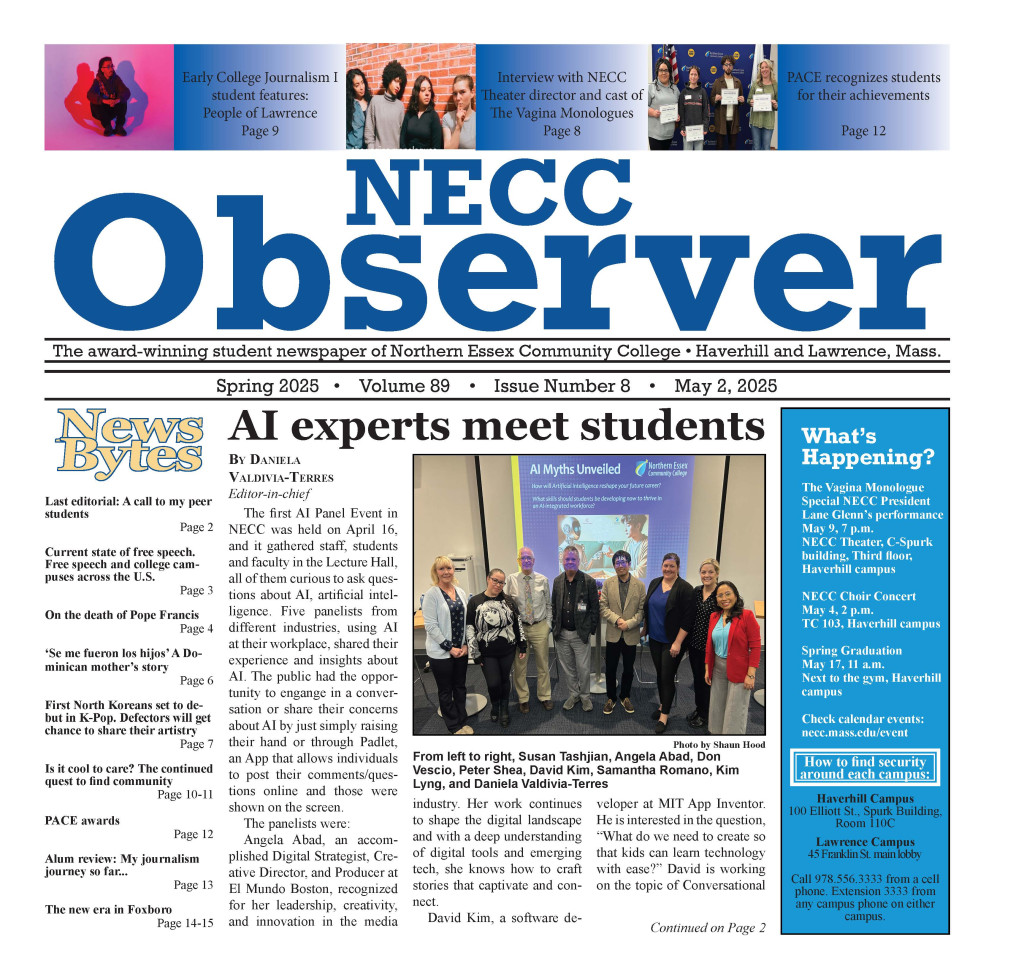Opinions on campus regarding the addition of the Methuen Police Academy and Essex County Sheriff’s Department vary widely. The debate began on the quad and in the hallways but quickly has moved into Student Senate meetings, the pages of the NECC Observer and even onto social media. Former student Faith Gregory encountered a training activity on campus in late October that she found to be particularly aggressive and inappropriate for a college campus. She voiced her thoughts on Facebook and a heated argument ensued. She also wrote a letter to the editor which ran in the last issue of the NECC Observer. Also during this training activity, members of Little Sprouts were using the field in front of the D building for their daily walk. Observer staff noticed a child who seemed to be upset by the activities.
After seeing photos of the training, Erin Davis, an Early Childhood Education major and former teacher at Little Sprouts, said, “As a 3-year-old … they don’t understand practice, that they’re not really hurting each other. Shouting messes with a kids head… they think people are mad when they scream, so now they think everyone out on the campus is mad.”
Maureen Bly is the director of the Little Sprouts program. She said that even though their gym time has been limited by the presence of the police academies, she and the parents have been overall happy to have them on campus.
“…They talk to the kids, they give the kids little badges, so we haven’t really had any problems with having them here.”
Bly did say, though, that the teachers should not have continued their walk during that activity and that she was unaware of the level of aggression being displayed on the field in front of the D building.
“No, I’d rather the kids not see all that. I was unaware that was taking place,” Bly said. “I wish they would notify us so we would know. We wouldn’t be out walking around while they’re doing it. I don’t know how appropriate it is to do it out [in front of] the college kids either.”
Students have expressed strong opinions on both sides of this issue. Sienna Smeland-Wagman was taking a quiz in Environmental Studies when the training exercise began that October day. “I heard a violent yell and the first thing I thought was ‘school shooting,’” Smeland-Wagman said. “It seems very dehumanizing. What I see is so violent and aggressive.”
Brian Ducey agrees that the level of violence being displayed can be upsetting. “They are just the most distracting thing I’ve ever seen,” said Ducey, who was particularly concerned with the idea that these trainees had only been training for a few weeks and felt that the emphasis of their training should be on de-escalating violent situations.
“Clearly it’s very aggressive, they’re constantly yelling. Right now, they’re just beating pads with nightsticks just to get … how to more efficiently beat someone down. It just really confuses me.”
Other students, such as Sheila Rivera and Vianca Santa, enjoy watching them practice. “I think it’s cool. I like to watch them,” said Rivera, who felt that it’s interesting to see training drills that many people would not usually have the opportunity to experience.
Devin Ditomaso is also not bothered by their presence on campus. “It doesn’t disrupt me at all,” he said. Although, as we continued to watch, he stated, “A big group of them just ran over there. (Someone close to me) has PTSD… if she was in that group and all those guys suddenly just ran over to her, she would have froze right the hell up in panic.”
The issue was exacerbated a few days after the October exercise, when Methuen Police Academy trainees were running a drill in the stairways of the C building.
In this drill, which was conducted during active school hours, trainees were climbing the staircase with fingers pointed to simulate aiming a gun while shouting “Clear!”
Students entering the stairwell were surprised by the encounter, to say the least.
Concerns were raised in a Student Senate meeting. According to the minutes, NECC Vice President David Gingerella said that “he was told by the academy that the event regarding cadets pointing finger guns at students had not occurred.”
NECC administration has addressed a few of the concerns by moving some of the training activities to the other side of the D building.
In order to better answer questions and address any lingering issues, an event has been scheduled for Dec. 2 in the Hartleb Technology Center in which students, instructors and administrators will be able to meet and express their concerns.
The event will begin at 11:30 a.m. with an opportunity for informal introductions. This will be followed by brief informational speeches by representatives from both academies, NECC administration and Student Senate, concluding with a question and answer session.
In the meantime, any questions or issues can be addressed by contacting George Moriarty, executive director of Workforce Development at gmoriarty@necc.mass.edu.
The NECC Observer will follow up on this story as more information becomes available.

